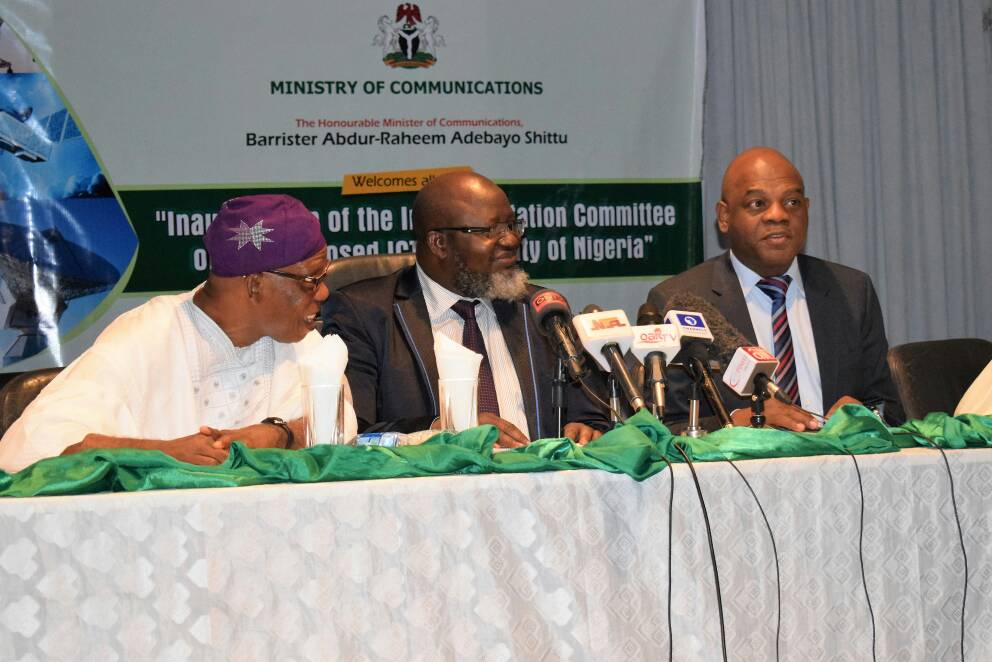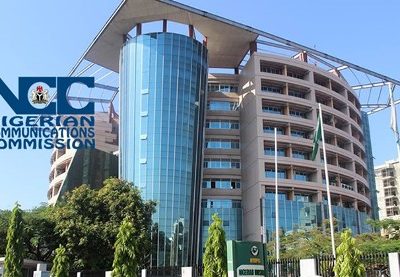Nigeria’s Minister of Communications, Mr. Abdur-Raheem Adebayo Shittu has today in Abuja inaugurated the implementation committee for the proposed ICT varsity. The University of ICT is expected to help provide the required manpower to manage and boost Nigeria’s burgeoning ICT sector.
A delighted Shittu said with the inauguration, a new history was being written in the annals of ICT development in Nigeria. Members of the steering committee who are to help provide the framework for the set up of the ICT varsity include Prof Julius Okojie, Dr. Amina Sambi-Magaji, Prof. Ibikunle Tijani, Wole Oyeniran, Dr. Henry Nkemadu, Eng. Kazeem Raji, Dr. Joshua Atah, Abdulhakeem Ajijola, and Liz Donaholu. Others are Prof. Patience Akpan-Obong, Prof. Olusegun Okunnu, Prof. Aderounmu Adesaola, Dr. Suleiman Mohammed, Olaniyan Mathew, Ayoola Oke, Hakeem Adeniji Adele, Chris Uwaje, Kabir Usman, Tajudeen Kareem, and Dr. Suleiman Garba.
Part of Shittu’s inauguration speech reads:
“ICT sector has come to play a critical role in the sustainable growth and development of this nation. At the rate of 24.42 percent, the ICT sector is currently the fastest growing in the Nigerian economy. This exponential growth in the sector was heralded by the liberalization of the telecommunications industry alongside the technological development in the industry, supported by sound policy and regulatory frameworks. The result of this is an increasingly competitive industry, reduced digital divide, increased contribution to the GDP as well as an overall positive impact on all sectors of the nation’s economy.

From L-R: Mr. Adebayo Shittu, Minister of Communications and Mr. Sunday Echono, Permanent Secretary, Ministry of Communications and DG of NITDA, Dr. Isa Ali Ibrahim Pantami.
“It is of interest to note that although the global ICT industry is both promising and flourishing, the local industry has continued to suffer from skills shortage, with nowhere near enough professionals to meet the demand for niche roles being created as a result of rapid technological development. As you are aware, on my assumption of duty as Hon. Minister of Communications, the Ministry organized the Communications Sector Retreat. The retreat was targeted at fashioning strategies that would re-position the sector as the key driver of the Nigerian economy. One of the fallout of the retreat was the fact that there were several unfilled vacancies in the Nigeria ICT industry because many jobs seeking Nigerian graduates do not possess the requisite skills to take up such opportunities. Expatriates have had a field day. This contrasts sharply with the fact that we have a large pool of unemployed youths in the country.
“The potentials of the DBI are enormous and the benefits to the country unquantifiable. The Institute, when transformed into the ICT varsity, will provide fit-for-purpose curricular to cater for University graduates with specialization in various ICT fields and expertise. This will create employment opportunities for Nigerians both locally, within the West-African sub-region and even at the international level, aside from several opportunities that would be created for self-employment.
“The global ICT industry is both promising and flourishing, the local industry has continued to suffer from skills shortage, with nowhere near enough professionals to meet the demand for niche roles being created as a result of rapid technological development.”
“Distinguished ladies and gentlemen, Research & Development and human capacity building are key focus areas critical for the full development and harnessing of ICT towards fast-tracking socio-economic progress in Nigeria. R&D propels innovation while human capacity building helps to equip the people with necessary skills and literacy to innovate and to use ICT for further development. In many cases in the past, researches have been carried out without recourse to the relevant industries. Consequently, many outcomes of such researches have remained in the laboratories and not in the industry where they would have been exploited. In countries such as South Korea, Singapore, India, and Thailand where ICTs have propelled economic development, ICT curriculum in institutions such as Universities, Polytechnics, and Technical Schools are developed with the industry as a focus. Thus, students from such institutions on completion of programmes continue to find relevance in the industry.
“The establishment of a specialized ICT University is not peculiar to Nigeria alone. Such institutions located around the globe include the Multimedia University of Malaysia; IT University of Gutenberg, Sweden; IT University of Copenhagen, Denmark; the Informatics Institute in Singapore; University of Information Technology and Management, Poland.”
“In addition, in the countries mentioned earlier, ICT capacity building including R&D are championed by the private sector; thus creating opportunities for continuous linkage between the outcome of researches and the industry. In this regard, the proposed ICT varsity of Nigeria should be driven by the ICT industry itself. The University would offer varieties of programmes aimed at providing specialist knowledge and expertise required for a professional career in the broad field of Information Communication Technology such as Telecommunications, Internet of Things, Cyber Security, Robotic embedded systems, Computer forensics, digital media, and Entertainment technology. The University would also be expected to offer skills development programmes in emerging and transformational technologies such as Cloud Computing and Big Data. It is expected that each of the six Campuses of the present DBI would be transformed into a centre of technological excellence in specific areas of ICT. Teaching experience in the new university should include a blend of theory, analysis, innovation and hands-on activities, such as project-based learning and live industry-led projects.
“I wish to reiterate here that the establishment of a specialized ICT varsity is not peculiar to Nigeria alone. Such institutions located around the globe include the Multimedia University of Malaysia; IT University of Gutenberg, Sweden; IT University of Copenhagen, Denmark; the Informatics Institute in Singapore; University of Information Technology and Management, Poland; Jaypee University of Information Technologies, India; Tashkent University of Information Technologies, Uzbekistan; Chongqing University of Posts and Telecommunications in China; and the Beijing University of Posts and Telecommunications.
“ I am also pleased to inform you that we have secured necessary endorsements from relevant stakeholders both within and outside of government including global leaders in the ICT industry such as Cisco, Facebook, Huawei, Mtn, D-Links, Globacom, Lenovo, Samsung, Apple, Siemens – Nortel, Intel, Motorola, Ericsson, Dell, HP, ZTE, and IBM. These industry giants have expressed their unequivocal support for this project with pledges in the provision of faculty, library content, syllabus, logistics, including funds towards the realization of the ICT varsity of Nigeria. In other words, we shall be partnering with some of these globally-acknowledged ICT giants to run the ICT varsity of Nigeria on a public-private partnership basis.
“It is my conviction, therefore, that as demand for ICT products and services in Nigeria grow rapidly with the emergence of a digital economy, the demand for ICT skills is expected to also grow exponentially. There is a need for capacity of ICT education in Nigeria to be strengthened to provide the required skills. It is also my hope that the seamless linkage which would be created between the academia and industry as a result of the establishment of the ICT varsity of Nigeria will not only lead to constant improvement of the curriculum but also drive innovation through joint research and development programmes. Of course, the unquantifiable benefits of this revolutionary initiative would be to the greatest advantage of Nigeria in particular, Africa and the world in general.
“In view of the importance attached to this assignment, members of this Committee have been carefully selected to reflect men and women who have made their marks in ICT development in Nigeria, including people who have constantly put the future outlook and the potential of the Nigeria ICT sector in view. My expectations at the end of the assignment of this Committee would be an extensive business case for this project with details such as:
“A very robust Curriculum of the proposed ICT varsity of Nigeria;
DBI’s facilities utilization including upgrade and expansion where necessary;
Proposed faculty members for the University including resource persons;
Framework for collaboration between the university and the industry on one hand and between the university and global industry giants; A sustainable PPP Model for funding the University; and Regulations and standards for the proposed university.
“While assuring you that all efforts are already in top gear to appoint both an Acting Vice-Chancellor and an Acting Registrar for this University within the next few weeks, I expect your full report to be submitted to my office within six weeks from today. Furthermore, copies of a draft bill for the consideration of the Federal Executive Council and ultimate transmission to the National Assembly for passage into law would be circulated to members of this Committee for your inputs. It is hoped that members would bring their respective experiences and knowledge and wisdom to bear on the final draft of the bill.”































